News Corporation is struggling to mount a legal defence to its allegations against actor Geoffrey Rush. And then there’s the chilling effect on the #metoo campaign. Hannah Marshall from Marque Lawyers breaks it down.
Things are looking grim for the Daily Telegraph in its defence of Geoffrey Rush’s defamation case. The story of the litigation has taken a very distinct turn in Rush’s favour. That story is a courtroom drama and the protagonists are the barristers, lawyers and the judge.
Behind the story of the litigation is another story. One that we won’t hear. That’s the story of what actually happened during the production of King Lear. That’s the one with Geoffrey Rush and Eryn Jean Norvill in it. Not the STC, not their co-stars, not the Tele. No-one else really, truly knows what happened. Only them.
 By commencing this defamation action, Rush seeks vindication; proof that he did not commit the acts of which he was publicly accused. The legal system tries its very best to provide actual vindication and find actual truth. But often it can’t. Cases like the Rush case make this painfully clear.
By commencing this defamation action, Rush seeks vindication; proof that he did not commit the acts of which he was publicly accused. The legal system tries its very best to provide actual vindication and find actual truth. But often it can’t. Cases like the Rush case make this painfully clear.
The judge will make his decision based on the pleadings, which document the parties’ claims and defences, and the evidence presented by Rush and the Tele. That’s the way our legal system works.
Rush’s claim says that the Tele articles broadly carried two kinds of defamatory imputations; non-sexual imputations that he behaved inappropriately, and then sexual imputations, that he was a sexual predator, sexually harassed an actress, and even engaged in sexual assault.
The Tele’s defence says that none of those imputations arose from its articles. It also claimed it could prove the truth of the non-sexual imputations. Notably, the Tele did not claim it could prove the truth of the sexual imputations. Then it argued another defence called qualified privilege over all of the imputations. That can apply even if the Tele can’t prove truth.
In a pre-trial hearing recently, the judge struck out all of the Tele’s truth defence and part of the qualified privilege defence. That doesn’t mean that the case is over. The Tele can still argue about whether the imputations arose and whether the qualified privilege defence will apply. And apparently the Tele intends to appeal the decision and try to re-plead its defence, so things could change again.

The reason that the Tele’s truth defence was struck out was that it couldn’t provide sufficient detail of what it alleged Rush actually did to Norvill. It claimed it could prove that he had a crush on her, and that he touched her inappropriately while on stage during performances of King Lear. It couldn’t say how, or where he touched her. It couldn’t say why it was inappropriate, or why it went beyond the degree of touching necessary for the play.
The Tele also claimed it could prove that Rush entered the women’s bathroom while Norvill was inside a cubicle, that she told him to fuck off, and then he left. It couldn’t say why he went in. It didn’t, for example, claim that it could prove that he went in there to harass her.
The judge said the Tele’s details weren’t sufficient for Rush to be able to answer the allegations, and they weren’t sufficient to prove that he had acted inappropriately.
The most obvious reason that the Tele couldn’t prove these things, and that it couldn’t plead truth to the sexual imputations, has to be that Norvill is not a witness. If it had her testimony, it ought to be able to provide all the missing details that were fatal to its truth defence.
Elsewhere in its defence, the Tele describes some of its sources of information.
It claims that prior to publication it had information that Norvill had complained to the STC that Rush had touched her genitals during the King Lear production without her consent. But the Tele does not name Norvill as the source of that information. It names another actress, Sarah Monahan, as the source.
The genital touching allegation didn’t make it into the Tele’s truth defence. Presumably Monahan didn’t witness the touching (she wasn’t in the show); someone just told her about it. That would make it inadmissible as proof of the touching happening. It could only be used to show what information the Tele had when it published.
There’s also a notable absence of reference to the toilet allegations where the Tele describes the information that it had prior to publishing the stories. Reading between the lines, these allegations may not have been known to the Tele until later.
The point is that what’s actually on trial in this case is the Tele; the words it published, the defences it pleaded and the evidence it can bring to court. Not Norvill. Not her complaint. Not whether Rush actually harassed or even assaulted her.
Without Norvill’s account of what happened being put before the Court, the litigation is unlikely to shed any real light on what happened on the stage at the STC. Instead we’ll see a courtroom drama focused on the words that the Tele published, their ‘natural ordinary meaning’, the public interest in #metoo allegations, and whether the Tele acted reasonably.
To be clear, Norvill’s under no obligation whatsoever to participate in the proceedings. She didn’t write the stories. She didn’t give a statement to the Tele and she sought for her name to be withheld. It would be understandable if she didn’t want to be a witness. The unfortunate truth though is that without her, the case has less meaning.
If Rush loses, it’s not necessarily proof that he harassed Norvill or that he’s a sexual predator. It might just be proof that the Tele’s words didn’t create those inferences. Or that there was such a great public interest in the story being told that it didn’t matter if it wasn’t completely accurate.
If Rush wins, it might prove that the Tele didn’t investigate thoroughly enough before it published. That it should have chosen better words. That it shouldn’t have published without an account from Norvill herself.
All that is actually, technically on trial is the Tele. Whether its evidence is good enough. Whether its defences hold up. That’s the courtroom drama. It won’t, and it can’t, prove whether Rush assaulted Norvill.
That’s another story altogether. We won’t hear it. And because of the chilling effect of cases like this, there are probably a lot of other #metoo stories that we won’t hear either. That’s on the Tele.
* Correction: an earlier version of this story incorrectly suggested Sarah Monaghan was in the stage production of King Lear. She was not involved in the production. The story has been corrected.
Donate To New Matilda
New Matilda is a small, independent media outlet. We survive through reader contributions, and never losing a lawsuit. If you got something from this article, giving something back helps us to continue speaking truth to power. Every little bit counts.




